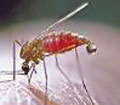
Scientists have discovered a link between different strains of malaria parasites that causes severe disease. This discovery could pave the way for development of vaccines or drugs to combat life-threatening cases of the infection.
The study done at the University of Edinburgh concludes that a key protein that is common to many potentially fatal forms of the disease, and found that antibodies that targeted this protein were able to fight these severe malaria strains.
The protein with sticky qualities made it able to bind it to red blood cells and form dangerous clumps that can block blood vessels. These clumps, or rosettes, can cause severe illness, including coma and brain damage.
Currently, between 10 and 20 per cent of people with severe malaria collapse, the disease, which is spread by mosquito bite, kills around one million lives every year.
Malaria parasites once enter in the bloodstream has ability to change the protein molecules on their surfaces to escape being attacked by the immune system. These surface proteins are normally poor targets for treatments or vaccines because they vary between different malaria parasite strains.
Currently, the researchers have observed that the surface proteins of rosette-forming parasites have similarities that may enable them to act as a target for treatments to stop development of the disease.
The scientist worked in cooperation with collaborators from Cameroon, Mali, Kenya and Gambia in order to test their antibodies against parasites collected from patients.
"We knew that clusters, or rosettes, of blood cells were found in many cases of severe or life-threatening malaria, so we looked at rosette-forming parasites and found a common factor that we could target with antibodies. We hope this discovery will inform new treatments or vaccines to block the formation of rosettes and so prevent many life-threatening cases of malaria," Professor Alexandra Rowe of the University of Edinburgh's School of Biological Sciences, who led the study, has been quoted as saying.
PLoS Pathogens has published the findings of this study.
--with inputs from ANI
|
|


Comments: